湖南省邵东县第三中学2015-2016学年高二下学期第一次月考英语试题 Word版无答案.doc
20152015---2016学年度高二第一学期英语月考试题答案2.doc
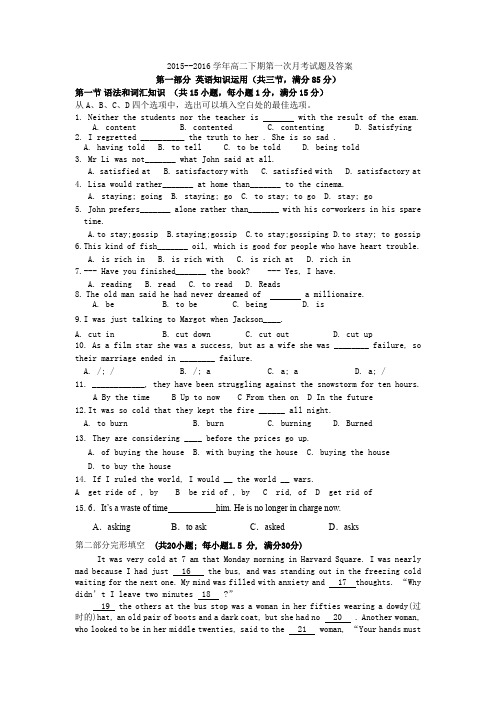
2015--2016学年高二下期第一次月考试题及答案第一部分英语知识运用(共三节,满分85分)第一节语法和词汇知识(共15小题,每小题1分,满分15分)从A、B、C、D四个选项中,选出可以填入空白处的最佳选项。
1. Neither the students nor the teacher is with the result of the exam.A. contentB. contentedC. contentingD. Satisfying2. I regretted __________ the truth to her . She is so sad .A. having toldB. to tellC. to be toldD. being told3. Mr Li was not_______ what John said at all.A. satisfied atB. satisfactory withC. satisfied withD. satisfactory at4. Lisa would rather_______ at home than_______ to the cinema.A. staying; goingB. staying; goC. to stay; to goD. stay; go5. John prefers_______ alone rather than_______ with his co-workers in his spare time.A.to stay;gossipB.staying;gossipC.to stay;gossipingD.to stay; to gossip6.This kind of fish_______ oil, which is good for people who have heart trouble.A. is rich inB. is rich withC. is rich atD. rich in7.--- Have you finished_______ the book? --- Yes, I have.A. readingB. readC. to readD. Reads8.The old man said he had never dreamed of a millionaire.A. beB. to beC. beingD. is9.I was just talking to Margot when Jackson____.A. cut inB. cut downC. cut outD. cut up10. As a film star she was a success, but as a wife she was ________ failure, so their marriage ended in ________ failure.A. /; /B. /; aC. a; aD. a; /11. ____________, they have been struggling against the snowstorm for ten hours.A By the timeB Up to nowC From then onD In the future12.It was so cold that they kept the fire ______ all night.A. to burnB. burnC. burningD. Burned13. They are considering ____ before the prices go up.A. of buying the houseB. with buying the houseC. buying the houseD. to buy the house14. If I ruled the world, I would __ the world __ wars.A get ride of , byB be rid of , byC rid, ofD get rid of15.6.It’s a waste of timehim. He is no longer in charge now.A.asking B.to ask C.asked D.asks第二部分完形填空 (共20小题; 每小题1.5 分, 满分30分)It was very cold at 7 am that Monday morning in Harvard Square. I was nearly mad because I had just 16 the bus, and was standing out in the freezing cold waiting for the next one. My mind was filled with anxiety and 17 thoughts. “Why didn’t I leave two minutes 18 ?”19 the others at the bus stop was a woman in her fifties wearing a dowdy(过时的)hat, an old pair of boots and a dark coat, but she had no 20 . Another woman, who looked to be in her middle twenties, said to the 21 woman, “Your hands must be very cold.You’ll get frostbitten(冻伤的)in this weather.” She 22 her heavy backpack to the ground, bent down, and began 23 for something inside her backpack. The older woman looked 24 and said, ”Oh no, that’s OK. I’m 25 .The younger woman continued to search 26 in her backpack and the older woman kept repeating, “Don’t 27 yourself. I’ll be all right.” After 28 seemed like so many minutes, the younger woman 29 a pair of purple gloves. She took the older woman’s hands and gently 30 a glove on each hand, covering one finger 31 . The older woman said, “Thank you. You’re so sweet.”Though I was very cold, the act of 32 gave ma a warm feeling inside. It also motivated(激发)me to buy five pairs of purple gloves, similar to hers, and 33 them in my bag, just in case I 34 someone who was in great 35 on a cold day.16. A. missed B. got C. waited D. seen17. A. negative B. happy C. good D. creative18. A. ago B. early C. late D. soon19. A. With B. Between C. Among D. Before20. A. shoes B. coat C. scarf D. gloves21. A. older B. younger C. latter D. shorter22. A. pushed B. pulled C. lifted D. dropped23. A. watching B. caring C. looking D. leaving24. A. down B. up C. away D. out25. A. sorry B. fine C. happy D. glad26. A. for B. of C. with D. around27. A. upset B. trouble C. save D. satisfy28. A. it B. that C. what D. she29. A. pulled out B. picked up C. picked out D. put on30. A. gave B. took C. situated D. placed31. A. at once B. at times C. at a time D. at one time32. A. happiness B. kindness C. rudeness D. sadness33. A. lie B. take C. hang D. put34. A. took care B. ran into C. learned of D. turned to35. A. need B. honor C. shock D. surprise第二部分阅读理解(共两节,满分40分)第一节(共15小题;每小题2分,满分30分)阅读下面短文,从短文后各题的A、B、C、D四个选项中,选取出适合填入空白处的最佳选项。
2015~2016学年度第二学期高二年级第一次月考英语试题
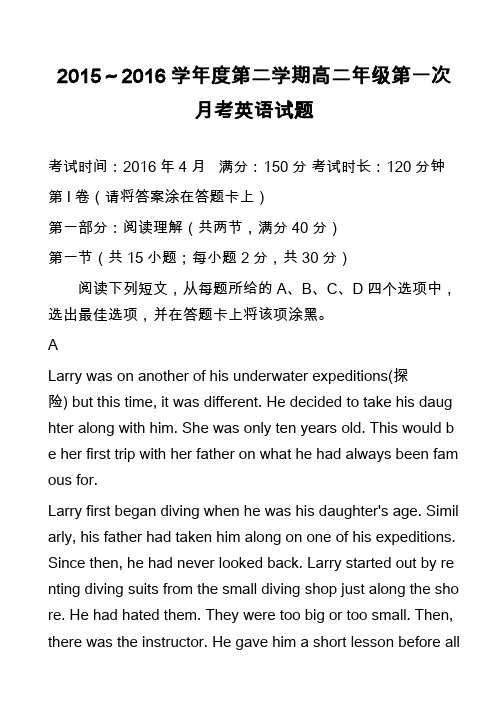
2015~2016学年度第二学期高二年级第一次月考英语试题考试时间:2016年4月满分:150分考试时长:120分钟第I卷(请将答案涂在答题卡上)第一部分:阅读理解(共两节,满分40分)第一节(共15小题;每小题2分,共30分)阅读下列短文,从每题所给的A、B、C、D四个选项中,选出最佳选项,并在答题卡上将该项涂黑。
ALarry was on another of his underwater expeditions(探险) but this time, it was different. He decided to take his daug hter along with him. She was only ten years old. This would b e her first trip with her father on what he had always been fam ous for.Larry first began diving when he was his daughter's age. Simil arly, his father had taken him along on one of his expeditions. Since then, he had never looked back. Larry started out by re nting diving suits from the small diving shop just along the sho re. He had hated them. They were too big or too small. Then, there was the instructor. He gave him a short lesson before allowing him into the water with his father. He had made an exc eption. Larry would never have been able to go down without at least five hours of theory and another similar number of ho urs on practical lessons with a guide. Children his age were n ot even allowed to dive.After the first expedition, Larry's later diving adventures only g ot better and better. There was never a dull moment. In his bl ack and blue suit and with an oxygen tank fastened on his ba ck, Larry dived from boats into the middle of the ocean. Dang erous areas did not prevent him from continuing his search. S ometimes, he was limited to a cage underwater but that did n ot bother him. At least, he was still able to take photographs o f the underwater creatures.Larry's first expedition without his father was in the Cayman Is lands. There were numerous diving spots in the area and Larr y was determined to visit all of them. Fortunately for him, a m an offered to take him around the different spots for free. Larr y did not even know what the time was, how many spots he di ved into or how many photographs he had taken. The diving s pots afforded such a wide array of fish and sea creatures that Larry saw more than thirty varieties of creatures.Larry looked at his daughter. She looked as excited as he had been when he was her age. He hoped she would be able to continue the family tradition. Already, she looked like she was much braver than had been then. This was the key to a succe ssful underwater expedition.1. In what way was this expedition different for Larry?A. His daughter had grown up.B. He had become a famous diver.C. His father would dive with him.D. His daughter would dive with him.2. What can be inferred from Paragraph 2?A. Larry had some privileges.B. Larry liked the rented diving suits.C. Divers had to buy diving equipment.D. Ten-year-old children were permitted to dive.3. Why did Larry have to stay in a cage underwater sometime s?A. To protect himself from danger.B. To dive into the deep w ater.C. To admire the underwater view.D. To take photos more c onveniently.BIt was a wonderful day on the west coast. On a beach near S an Francisco, two college students, Shirley and Albert, decide d to go for a swim. So they swam out about fifty yards to calm water and then began floating lazily. Little did they know that they were being watched — a great white shark was drawing near.All of a sudden, Shirley heard a scream. Albert was being pull ed down by something. His head reappeared with blood. Albe rt cried out in agony, “Get away, Shirley! Get away! It’s a shar k!” Albert didn’t want her help.Shirley was too frightened and shocked to move. Albert’s wor ds rang in her ears. After what seemed like a long time, she tu rned toward shore and began swimming for her life. But then she stopped. She could not leave her friend. She had to help him if she could.The water was full of red blood. She reached for Albert’s hand and then pulled back in terror. She wrapped her arm around Albert’s chest. He was alive. Shirley began kicking her feet an d stroking(划水) with her free arm. The two friends began the slow journey toward shore. Would the shark return? Would it bring its friend s? Shirley was getting tired. Albert’s body seemed to get heavier every second. But she wouldn’t let go. She wouldn’t leave her friend.Finally, Shirley could touch bottom. At this point, she was exh austed. She could go no farther. She tried to scream for help but her voice was so weak. Nobody would be able to hear tha t. Miraculously(奇迹般地), Joe was fishing some distance down the beach. His eyes for some reason turned. He could hardly believe his eyes. Joe began running toward Shirley and Albert. He then flung(挥动) his cast like a cowboy with his rope. The line perfectly lan ded beside Shirley and Albert. Shirley wrapped it around her waist and Joe dragged them into safety. By this time, many p eople saw the trouble and ran to help. Soon Albert was taken to the hospital but died two hours later.Many of us will never be in a situation to sacrifice our lives for someone else like Shirley and Albert. But that does not mean that we do not sacrifice our self. If our motive and desire is to put other people before our self then we do sacrifice our self. Sacrifice is a necessary part of loving people.5. The underlined word “agony” in Paragraph 2 means ______ _____.A. excitementB. painC. disappointmentD. shock6. While Albert was being pulled down by the shark, he was m ost probably thinking that ________.A.he would surely be saved by ShirleyB.the white shark would leave soonC.it was unlucky for them to swim out that dayD.he should warn his friend7. When Shirley could touch bottom, ___________.A. her cry for help was luckily heard by a personB. a fishing person noticed Albert and her accidentallyC. a rescue team were waiting for them on the beachD. she found Joe fishing and shouted to him for help8. What does the author stress in the story?A.The threat from the dangerous shark.B.The ability to deal with an emergency.C.Shirley and Albert’s concern for each other.D.Shirley and Albert’s fight against the shark.CAlexandra Scott was born to Liz and Jay Scott in Manchester, Connecticut on January 18, 1996, the second of four children . Shortly before her first birthday, she was diagnosed with neu roblastoma, a type of childhood cancer.On her first birthday, the doctors informed Alex’s parents that even if she beat her cancer it was doubtful that she would eve r walk again. Just two weeks later, Alex slightly moved her leg at her parents’ request to kick. This was the first indication th at she would turn out to be a courageous and confident child with big dreams and big accomplishments.By her second birthday, Alex was able to stand up with leg br aces(支架). She worked hard to gain strength and to learn how to wal k. She appeared to be overcoming the difficulties, until the sh ocking discovery within the next year that her tumors(肿瘤) had started growing again. In the year 2000, the day after her fourth birthday, Alex received a stem cell transplant(干细胞移植) and informed her mother, “When I get out of the hospital I want to have a lemonade stand.” She said she wanted to give the money to doctors to allow them to “help other kids, like th ey helped me.” True to her word, she held her first lemonade stand later that year with the help of her older brother and rais ed an amazing $ 2,000 for “her hospital”.While bravely battling her own cancer, Alex and her family co ntinued to hold yearly lemonade stands in her front yard to be nefit childhood cancer research. People from all over the world, moved by her story, held their own lemonade stands and d onated the earnings to Alex and her cause.In August of 2004, Alex passed away at the age of 8, knowing that, with the help of others, she had raised more than $ 1 mil lion to help find a cure for the disease that took her life. Alex’s family — including brothers Patrick, Eddie, and Joey — and s upporters around the world are committed to continuing her in spiring cause through Alex’s lemonade Stand Foundation(基金会).9. It can be learned from the text that Alex _________.was born with cancercouldn’t walk until she was fourC. was the only daughter of the ScottsD. held her first lemonade stand in 200110. Why was Alex’s lemonade Stand Foundation founded?A. To promote her lemonade.B. To set up a children’s hospital.C. To attract public attention to her disease.D. To collect money to help children with cancer.11. What did the public do to support Alex and her cause?A. They helped her sell lemonade.B. They provided free stands for her.C. They donated money to her foundation.D. They donated stem cells for her operation.12. Which of the following can best describe Alex?A. Stubborn.B. Energetic.C. Innocent.D. Determined.DNurses have saved almost 800 lives in just one year by using iPads, iPods and mobile phones instead of paper charts to re cord patients’ vital signs.Death rates at two major hospitals dropped by more than 15% after nursing staff started using handheld devices(设备) instead of paper notes to monitor the condition of patients, according to a research published recently.Nurses recorded patients’ blood pressure, pulse, oxygen level s and other indicators(指标) on tablets and mobiles. Specialist software, called VitalPA C,automatically told them if the patient was deteriorating(恶化). If this happened the nurse was warned to increase the fre quency of their monitoring of the patient and, in some cases, t o warn a doctor or a rapid response team.The introduction of the new system led to a fall of almost 400patient deaths in just 12 months at Queen Alexandra Hospital, Portsmouth, and a drop of more than 370 in the same period at James Cook University Hospital. An accompanying comme nt in the journal described the research as “an important miles tone” in improving patient safety and said the lowering of deat h rate at these two hospitals “represents a truly exciting and i mpressive improvement”.The system is now applied in 40 hospitals across England an d could eventually be rolled out across the whole of the NHS ( National Health Service). The system was developed by doct ors and nurses at Portsmouth working together with health im provement company The Learning Clinic.13. What can we learn about VitalPAC?A. It works with the handheld devices.B. It is applied in all the members of the NHS.C. It can replace the nurses to take care of patients.D. It was designed by The Learning Clinic independently.14. The underlined word “this” in Paragraph 3 refers to the sit uation where __________.A. the patient’s indicators are difficult to recordB. the patient’s condition is getting worseC. the specialist software is out of orderD. the patient’s vital signs are uploaded15. Where does the text probably come from?A. A science fiction.B. A lecture essay.C. A news report.D. A scientific research plan.第二节(共5小题;每小题2分,共10分)根据短文内容,从短文后的七个选项中选出能填入空白处的最佳选项。
【英语】湖南省邵东县第三中学2015-2016学年高二下学期第一次月考试题(普通班)
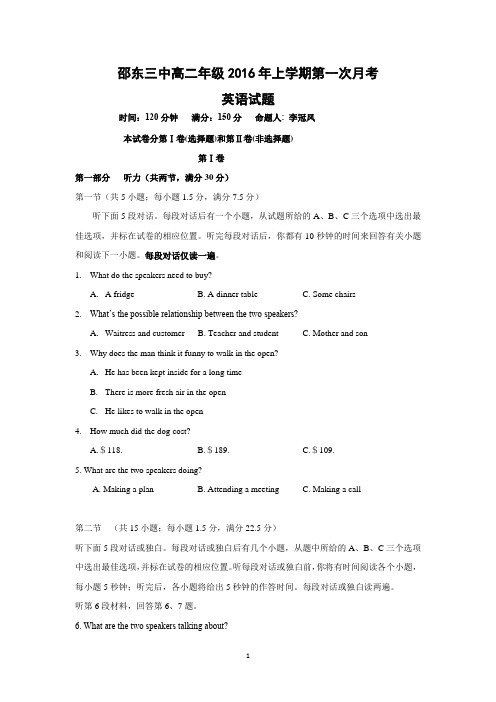
邵东三中高二年级2016年上学期第一次月考英语试题时间:120分钟满分:150分命题人: 李冠凤本试卷分第Ⅰ卷(选择题)和第Ⅱ卷(非选择题)第Ⅰ卷第一部分听力(共两节,满分30分)第一节(共5小题;每小题1.5分,满分7.5分)听下面5段对话。
每段对话后有一个小题,从试题所给的A、B、C三个选项中选出最佳选项,并标在试卷的相应位置。
听完每段对话后,你都有10秒钟的时间来回答有关小题和阅读下一小题。
每段对话仅读一遍。
1.What do the speakers need to buy?A. A fridgeB. A dinner tableC. Some chairs2.What’s the possible relationship between the two speakers?A.Waitress and customerB. Teacher and studentC. Mother and son3.Why does the man think it funny to walk in the open?A.He has been kept inside for a long timeB.There is more fresh air in the openC.He likes to walk in the open4.How much did the dog cost?A.$118.B.$189.C.$109.5. What are the two speakers doing?A. Making a planB. Attending a meetingC. Making a call第二节(共15小题;每小题1.5分,满分22.5分)听下面5段对话或独白。
每段对话或独白后有几个小题,从题中所给的A、B、C三个选项中选出最佳选项,并标在试卷的相应位置。
听每段对话或独白前,你将有时间阅读各个小题,每小题5秒钟;听完后,各小题将给出5秒钟的作答时间。
全国重点高中2015-2016学年高二下学期第一次月考英语试题
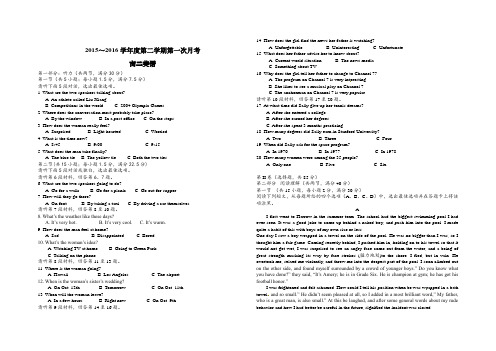
2015~2016学年度第二学期第一次月考高二英语第一部分:听力(共两节,满分30分)第一节(共5小题;每小题1.5分,满分7.5分)请听下面5段对话,选出最佳选项。
1. What are the two speakers talking about?A. An athlete called Liu Xiang.B. Competitions in the world.C. 2004 Olympic Games.2. Where does the conversation most probably take place?A. By the window.B. In a post office.C. On the steps.3. How does the woman really feel?A. Surprised.B. Light-hearted.C. Worried.4. What is the time now?A. 8:45.B. 9:00.C. 9:15.5. What does the man take finally?A. The blue tie.B. The yellow tie.C. Both the two ties.第二节(共15小题; 每小题1.5分,满分22.5分)请听下面5段对话或独白,选出最佳选项。
请听第6段材料,回答第6、7题。
6. What are the two speakers going to do?A. Go for a walk.B. Go for a picnic.C. Go out for supper.7. How will they go there?A. On foot.B. By taking a taxi.C. By driving a car themselves.请听第7段材料,回答第8至10题。
8. What’s the weather like these days?A. It’s very hot.B. It’s very cool.C. It’s warm.9. How does the man feel at home?A. Sad.B. Disappointed.C. Bored.10. What’s the woman’s idea?A. Watching TV at home.B. Going to Green Park.C. Talking on the phone.请听第8段材料,回答第11至13题。
高三英语月考试题及答案-邵东三中2016届高三第一次月考
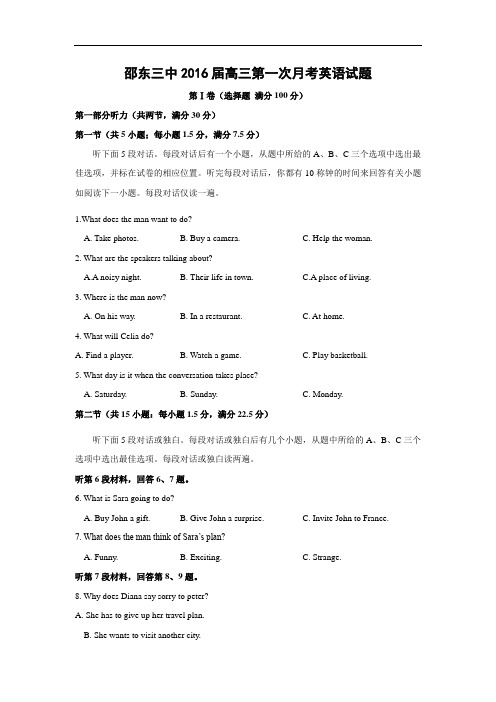
邵东三中2016届高三第一次月考英语试题第Ⅰ卷(选择题满分100分)第一部分听力(共两节,满分30分)第一节(共5小题;每小题1.5分,满分7.5分)听下面5段对话。
每段对话后有一个小题,从题中所给的A、B、C三个选项中选出最佳选项,并标在试卷的相应位置。
听完每段对话后,你都有10称钟的时间来回答有关小题如阅读下一小题。
每段对话仅读一遍。
1.What does the man want to do?A. Take photos.B. Buy a camera.C. Help the woman.2. What are the speakers talking about?A.A noisy night.B. Their life in town.C.A place of living.3. Where is the man now?A. On his way.B. In a restaurant.C. At home.4. What will Celia do?A. Find a player.B. Watch a game.C. Play basketball.5. What day is it when the conversation takes place?A. Saturday.B. Sunday.C. Monday.第二节(共15小题:每小题1.5分,满分22.5分)听下面5段对话或独白。
每段对话或独白后有几个小题,从题中所给的A、B、C三个选项中选出最佳选项。
每段对话或独白读两遍。
听第6段材料,回答6、7题。
6. What is Sara going to do?A. Buy John a gift.B. Give John a surprise.C. Invite John to France.7. What does the man think of Sara’s plan?A. Funny.B. Exciting.C. Strange.听第7段材料,回答第8、9题。
高二英语下学期第一次考试试题-人教版高二全册英语试题
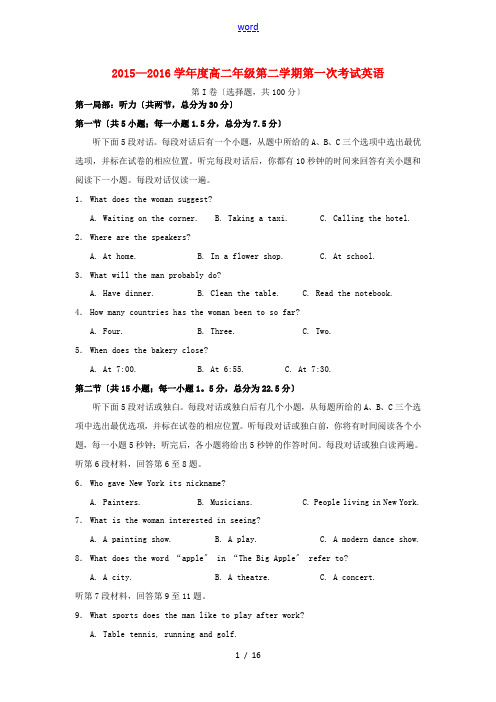
2015—2016学年度高二年级第二学期第一次考试英语第I卷〔选择题,共100分〕第一局部:听力〔共两节,总分为30分〕第一节〔共5小题;每一小题1.5分,总分为7.5分〕听下面5段对话。
每段对话后有一个小题,从题中所给的A、B、C三个选项中选出最优选项,并标在试卷的相应位置。
听完每段对话后,你都有10秒钟的时间来回答有关小题和阅读下一小题。
每段对话仅读一遍。
1.What does the woman suggest?A. Waiting on the corner.B. Taking a taxi.C. Calling the hotel. 2.Where are the speakers?A. At home.B. In a flower shop.C. At school.3.What will the man probably do?A. Have dinner.B. Clean the table.C. Read the notebook. 4.How many countries has the woman been to so far?A. Four.B. Three.C. Two.5.When does the bakery close?A. At 7:00.B. At 6:55.C. At 7:30.第二节〔共15小题;每一小题1。
5分,总分为22.5分〕听下面5段对话或独白。
每段对话或独白后有几个小题,从每题所给的A、B、C三个选项中选出最优选项,并标在试卷的相应位置。
听每段对话或独白前,你将有时间阅读各个小题,每一小题5秒钟;听完后,各小题将给出5秒钟的作答时间。
每段对话或独白读两遍。
听第6段材料,回答第6至8题。
6.Who gave New York its nickname?A. Painters.B. Musicians.C. People living in New York. 7.What is the woman interested in seeing?A. A painting show.B. A play.C. A modern dance show. 8.What does the word “apple〞in “The Big Apple〞 refer to?A. A city.B. A theatre.C. A concert.听第7段材料,回答第9至11题。
高中英语真题-2015-2016学年度秋学期第一次月考高二英语试卷

2015-2016学年度秋学期第一次月考高二英语试卷Class: Name: Marks: 满分(150)第一部分听力(共两节,满分30分)第一节(共5小题;每小题15分,满分7. 5分)听下面5段对话。
每段对话后有一个小题,从题中所给的A、B、C三个选项中选出最佳选项,并标在试卷的相应位置。
听完每段对话后,你都有10秒钟的时间来回答有关小题和阅读下一小题。
每段对话仅读一遍。
1.What’s John’s address?A.1343 King Street.B. 1344 Queen Street.C. 1434 King Street.2.How much should the skirt have cost?A . $6. B. $ 12. C. $ 24.3.What can we learn about the man?A .He might lie very often.B. His grandmother died just now.C. His grandfather gets ill quite often .4.When is the man’s birthday?A .March 31st . B. April 1st . C. April 2nd.5.How will the woman get to New York?A By carB By trainC By airplane第二节(共15小题;每小题1. 5分,满分22. 5分)听下面5段对话或独白。
每段对话或独白后有几个小题,从题中所给的A、B、C三个选项中选出最佳选项,并标在试卷的相应位置。
听每段对话或独白前,你将有时间阅读各个小题,每小题5秒钟;听完后,各小题将给出5秒钟的作答时间。
每段对话或独白读两遍。
听第6段材料,回答第6、7题。
6.What will the woman do on Friday night?A. Visit a friend.B. Work overtimeC. Have dinner with Tim.7.What is the woman’s phone number?A.917-8427.B. 917-8426.C. 916-8426.听第7段材料,回答第8至10题。
湖南省邵阳市邵东县第三中学2015-2016学年高二英语上学期期中试题

邵东三中2015年下期高二期中英语试卷总分:150分时量:120分钟注意事项:答第一卷前,考生务必将自己的姓名、准考证号填写在本试卷和答题卡相对应的位置上。
第一部分:听力(30分)第一节(共5小题;每小题1. 5分,满分7. 5分)听下面5段对话。
每段对话后有一个小题,从题中所给的A、B、C三个选项中选出最佳选项,并标在试卷的相应位置。
听完每段对话后,你都有10秒钟的时间来回答有关小题和阅读下一小题。
每段对话仅读一遍。
1. How does the man come here?A. By taxi.B. By car.C. By bus.2. Where do you think the conversation probably take place?A. At the grocer’s.B. At the dentist’s.C. At the teache r’s.3. Why is the man going to Germany?A. To open a factory there.B. To visit a factory there.C. To have a look at the country.4. What does the woman want to do?A. To go to the library.B. To go shopping.C. To eat something.5. What are the speakers mainly talking about?A. How to look after Ken.B. How to spend the vacation.C. How to deal with the woman’s cat.第二节(共15小题;每小题1. 5分,满分22. 5分)每段对话或独白读两遍。
听第6段材料,回答第6、7两个小题。
6. Why can’t the woman have the party on the twenty-ninth?A. She will see her doctor.B. She will travel to another city.C. She will attend a meeting.7. How long will the party run?A. Two hour s.B. Three hours.C. Four hours.听第7段材料,回答第8至9题。
- 1、下载文档前请自行甄别文档内容的完整性,平台不提供额外的编辑、内容补充、找答案等附加服务。
- 2、"仅部分预览"的文档,不可在线预览部分如存在完整性等问题,可反馈申请退款(可完整预览的文档不适用该条件!)。
- 3、如文档侵犯您的权益,请联系客服反馈,我们会尽快为您处理(人工客服工作时间:9:00-18:30)。
2016年上学期高二年级第一次月考英语试卷(实验班)第一部分听力(共两节,满分30分)第一节(共5小题;每小题1.5分,满分7.5分)听下面5段对话。
每段对话后有一个小题,从试题所给的A、B、C三个选项中选出最佳选项,并标在试卷的相应位置。
听完每段对话后,你都有10秒钟的时间来回答有关小题和阅读下一小题。
每段对话仅读一遍。
1.What do the speakers need to buy?A. A fridgeB. A dinner tableC. Some chairs2.What‟s the possible relationship between the two speakers?A.Waitress and customerB. Teacher and studentC. Mother and son3.Why does the man think it funny to walk in the open?A.He has been kept inside for a long timeB.There is more fresh air in the openC.He likes to walk in the open4.How much did the dog cost?A.$118.B.$189.C.$109.5. What are the two speakers doing?A. Making a planB. Attending a meetingC. Making a call第二节(共15小题;每小题1.5分,满分22.5分)听下面5段对话或独白。
每段对话或独白后有几个小题,从题中所给的A、B、C三个选项中选出最佳选项,并标在试卷的相应位置。
听每段对话或独白前,你将有时间阅读各个小题,每小题5秒钟;听完后,各小题将给出5秒钟的作答时间。
每段对话或独白读两遍。
听第6段材料,回答第6、7题。
6. What are the two speakers talking about?A. A new car.B. The latest newsC. Their work7. Why did the man buy a car?A. He is too old to go to work on foot.B. He is rich enough now.C. His home is far away from his office.听第7段材料,回答第8、9题8. When does the conversation take place?A. At 10:05B. At 9:55C. At 10:009. What does the man decide to do with his watch?A. Give it to the womanB. Buy a new oneC. Repair it听第8段材料,回答第10至12题.10. How long has the man been in London?A. One yearB. A few yearsC. A couple of months11. Why did the woman leave her hometown?A. To lead a city lifeB. To open a restaurantC. To find a job12. Where did the woman come from?A. LondonB. ArnsideC. Lancaster听第9段材料,回答第13至16题。
13. Where does the conversation most probably take place?A. In the streetB. At the railway stationC. In the office14. Where does the woman want to go?A. The bus stationB. The airportC. The railway station15. How does the woman go there in the end?A. By train B, By bike C. By taxi16. Why won‟t the woman go there by bus?A. There is no direct bus to the place.B. There is no bus there.C. The bus was far away.听第10段材料,回答第17至20题。
17. Where did the speaker see snow for the first time?A. In Hong Kong B, In the USA C. In Canada18. Why was the speaker very happy one evening?A. He didn‟t need to go to school.B. It was beginning to snow.C. He could put on warm clothes.19. Why didn‟t the children have to go to school?A. Heavy snow blocked the roads.B. They wanted to play on the snow field.C. Their teachers were sure that they liked snow.20. What did the children‟s mother do when asked to let them go out to play?A. Refused to let them go out.B. Told them to turn on the radio.C. Told them to wait until after breakfast.第二部分(共两节,满分40分)第一节阅读理解(共15小题;每小题2分,满分30分)AThe Cambridge Science Festival Curiosity ChallengeDare to Take the Curiosity Challenge!The Cambridge Science Festival(CSF)is pleased to inform you of the sixth annual Curiosity Challenge.The challenge invites,even dares school students between the ages of 5 and 14 to create artwork or a piece of writing that shows their curiosity and how it inspires them to explore their world.Students are being dared to draw a picture,write an article,take a photo or write a poem that shows what they are curious about.To enter the challenge,all artwork or pieces of writing should be sent to the Cambridge Science Festival,MIT Museum,265 Mass Avenue,Cambridge 02139 by Friday,February 8th.Students who enter the Curiosity Challenge and are selected as winners will be honored at a special ceremony during the CSF on Sunday,April 21st.Guest speakers will also present prizes to the students.Winning entries will be published in a book.Student entries will be exhibited and prizes will be given.Families of those who take part will be included in the celebration and brunch will be served.Between March 10th and March 15th,each winner will be given the specifics of the closing ceremony and the Curiosity Challenge celebration.The program guidelines and other related information are available at:http://cambridgesciencefestival.org.21.Who can take part in the Curiosity Challenge?A.MIT artists.B.Cambridge locals. C.CSF winners. D.School students.22.When will the prize-giving ceremony be held?A.On April 21st.B.On March 10th.C.On March 15th.D.On February 8th.23.What type of writing is this text?A.An exhibition guide.B.An announcement.C.An art show review.D.An official report.BAs more and more people speak the global languages of English,Chinese,Spanish,and Arabic,other languages are rapidly disappearing.In fact,half of the 6,000—7,000 languages spoken around the world today will likely die out by the next century,according to the United Nations Educational,Scientific,and Cultural Organization(UNESCO).In an effort to prevent language loss,scholars from a number of organizations—UNESCO and National Geographic among them—have for many years been documenting dying languages and the cultures they reflect.Mark Turin,a scientist at the Macmillan Center,Yale University,who specializes in the languages and oral traditions of the Himalayas,is following in that tradition.His recently published book,A Grammar of Thangmi with an Ethnolinguistic Introduction to the Speakers and Their Culture,grows out of his experience living,working,and raising a family in a village in Nepal.Documenting the Thangmi language and culture is just a starting point for Turin,who seeks to include other languages and oral traditions across the Himalayan reaches of India,Nepal,Bhutan,and China.But he is not content to simply record these voices before they disappear without record.At the University of Cambridge Turin discovered a wealth of important materials—including photographs,films,tape recordings,and field notes—which had remained unstudied and were badly in need of care and protection.Now,through the two organizations that he has founded—the Digital Himalaya Project and the World Oral Literature Project—Turin has started a campaign to make such documents,found in libraries and stores around the world,available not just to scholars but to the younger generations of communities from whom the materials were originally collected.Thanks to digital technology and the widely available Internet,Turin notes,the endangered languages can be saved and reconnected with speech communities.24.Many scholars are making efforts to ______.A.promote global languages B.search for language communitiesC.rescue disappearing languages D.set up language research organizations 25.What does “that tradition” in Paragraph 3 refer to?A.Writing books on language teaching.B.Having full records of the languages.C.Telling stories about language users.D.Living with the native speakers.26.What is Turin's book based on?A.His personal experience in Nepal.B.The documents available at Yale.C.His language research in Bhutan.D.The cultural studies in India.27.Which of the following best describes Turin's work?A.Write,sell and donate.B.Record,repair and reward.C.Design,experiment and report.D.Collect,protect and reconnect.CPlanning a visit to the UK? Here we help with ways to cut your costs.A VOID BIG EVENTS Big sporting events, concerts and exhibitions can increase the cost of accommodation and make it harder to find a room. A standard double room at the Thistle Brighton on the final Friday of the Brighton Comedy Festival (19 Oct.) cost £169.15 at . A week later, the same room cost £118.15.If you can be flexible and want to know dates to avoid—or you‟re looking for a big event to pass your time—check out sites such as , which allow you to search for events in the UK by city, date and category.STAY AWAY FROM THE STA TION If traveling to your destination by train, you may want to find a good base close to the station, but you could end up paying more for the sake of convenience at the start of your holiday.Don‟t be too choosy about the part of town you stay in. Booking two months in advance, the cheapest room at Travelodge‟s Central Euston hotel in London for Saturday 22 September was £95.95. A room just a tube journey away at its Covent Garden hotel was £75.75. And at Farringdon, a double room cost just £62.95.LOOK AFTER YOURSELF Really central hotels in cities such as London, Edinburgh and Cardiff can cost a fortune, especially at weekends and during big events. As an alternative consider checking into a self-catering flat with its own kitchen. Often these flats are hidden away on the top floors of ci ty centre buildings. A great example is the historic O‟Neill Flat onEdinburgh‟s Royal Mile, available for £420 for five days in late September, with room for four adults.GET ON A BIKE London‟s …Boris bikes‟ have attracted the most attention, but other c ities also have similar programs that let you rent a bicycle and explore at your own pace, saving you on public transport or car parking costs.Among the smaller cities with their own programs are Newcastle (casual members pay around £1.50 for two hours) and Cardiff (free for up to 30 minutes, or £5 per day).28. The Brighton Comedy Festival is mentioned mainly to show big events may __________.A. cause travelers to pay more for accommodationB. attract lots of travelers to the UKC. allow travelers to make flexible plansD. help travelers pass time29. “Farringdon” in Paragraph 5 is most probably __________.A. the tube line to Covent GardenB. a hotel away from the train stationC. an ideal holiday destinationD. the name of a travel agency30. The passage shows that the O‟Neill Flat __________.A. lies on the ground floorB. is located in central LondonC. costs over £100 on average per day in late SeptemberD. provides cooking facilities for tourists31. Cardiff‟s progr am allows a free bike for a maximum period of __________.A. one hourB. half an hourC. one hour and a halfD. two hoursDLast night‟s meteor(流星) shower left many people in the community dissatisfied and demanding answers. According to Gabe R othschild, Emerald Valley‟s mayor, people gathered in the suburbs of the city, carrying heavy telescopes, expecting to watch the brightly burning meteors passing through the sky. What they found instead was a sky so brightened by the city‟s lights that it darkened the light of the meteors passing overhead.“My family was so frustrated,” admitted town resident Duane Cosby. “We wanted to make this an unforgettable family outing, but it turned out to be a huge disappointment.”Astronomers---scientists who study stars and planets---have been complaining about thisproblem for decades. They say that light pollution prevents them from seeing objects in the sky that they could see quite easily in the past. They call on people and the government to take measures to fight against it.There is yet a population besides professional and amateur star observers that suffers even more from light pollution. This population consists of birds, bats, frogs, snakes, etc. For example, outdoor lightening severely affects migrating (迁徙) birds. According to the International Dark- Sky Association, “100 million birds a year throughout North America die in crashes with lighted buildings and towers.”Countless more animal casualties (伤亡) result from the use of artificial lighting. Clearly, people enjoy the benefits of lighting their evenings, but some scientists think it can be harmful for humans, too. They worry that exposure to light while sleeping can increase a person‟s chances of getting cancer.Emerald Valley is only one community that is becoming aware of the negative effects of light pollution. For years, Flagstaff, Arizona, has enforced lighting regulations in its city in order to assist astronomers at the Lowell Observatory. Similar efforts have been made worldwide, and a movement is underway to remind us to turn off lights when we are not using them, so that other creatures can share the night.32. It happened last night that __________________.A. the meteor flew past before being noticedB. the city‟s lights affected the met eor watchingC. the city light show attracted many peopleD. the meteor watching ended up in social outing33. What do the astronomers complain about?A. Meteor showers occur less often than beforeB. Their observation equipment is in poor repair.C. Their eyesight is failing due to artificial lighting.D. Light pollution has remained unsolved for years.34. What is the author concerned about according to Paragraph 4?A. Animal‟s survival is threatened by outdoor lighting.B. Animal‟s living habit s may change suddenly.C. Varieties of animals will become sharply reduced.D. Birds may take other migration paths.35. Lighting regulations in Flagstaff, Arizona are put into effect to ______________.A. lessen the chance of getting cancerB. ensure citizens a good sleep at nightC. create an ideal observation conditionD. enable all creatures to live in harmony 第二节七选五(共5小题;每小题2分,满分10分)UrbanizationUntil relatively recently, the vast majority of human beings lived and died without ever seeing a city. The first city was probably founded no more than 5,500 years ago. 36 . In fact, nearly everyone lived on farms or in tiny rural (乡村的) villages. It was not until the 20th century that Great Britain became the first urban society in history--- a society in which the majority of people live in cities and do not farm for a living.Britain was only the beginning. 37 .The process of urbanization--- the migration (迁移) of people from the countryside to the city--- was the result of modernization, which has rapidly transformed how people live and where they live.In 1990, fewer than 40% of Americans lived in urban areas. Today, over 82% of Americans live in cities. Only about 2% live on farms. 38 .Large cities were impossible until agriculture became industrialized. Even in advanced agricultural societies. It took about ninety-five people on farms to feed five people in cities.39 . Until modern times, those living in cities were mainly the ruling elite(精英) and the servants, laborers and professionals who served them. Cities survived by taxing farmers and were limited in size by the amount of surplus food that the rural population produced and by the ability to move this surplus from farm to city.Over the past two centuries, the Industrial Revolution has broken this balance between the city and the country. 40 . Today, instead of needing ninety-five farmers to feed five city people, one American farmer is able to feed more than a hundred non-farmers.A. The rest live in small towns.B. The effects of urban living on people should be considered.C. Soon many other industrial nations become urban societies.D. But even 200 years ago, only a few people could live in cities.E. Modernization drew people to the cities and made farmers more productive.F. Modern cities have destroyed social relations and the health of human beings.G. That kept cities very small.第三部分英语知识运用(共两节,满分45)第一节完形填空(共20小题;每小题1.5分,满分30分)阅读下面短文,从短文后各题所给的四个选项(A、B、C和D)中,选出可以填入空白处的最佳选项,并在答题卡上将该项涂黑。
